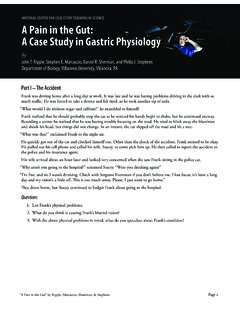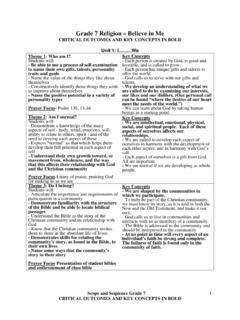Transcription of Believe in Me - Diocese of Charlottetown
1 Believe in Me Year 7 Please note: this file is an archived version of what we had posted on the old website (with a few formatting changes). Theme : Why Do I Need You? (Guide pages 158 - 166) Outcomes: Participants will name and evaluate the ways that being female or male shapes the way they express themselves. be able to define human dignity and recognize the things that support it and things that undermine it. know that to accept other people, we must accept their sexuality, their maleness or their femaleness, their physical gifts and limitations. identify ways Jesus reached out to those who were excluded. For the catechist: God created us male and female in the divine image. Humanity is incomplete unless it is both male and female.
2 In this theme participants will name and evaluate the ways they express themselves. They will explore issues of human dignity and recognize things that support it and undermine it. Human beings were created to share, give and love. We are incomplete if we live entirely as individuals. Our sexuality is part of who we are and must not be belittled. We must defend the dignity and value of ourselves and every human being. PREPARATIONS: Prepare slips of paper with one of the following scripture references on each: Luke 17:11-19; Luke 7: 36 - 48; Luke 8: 43 - 48; Luke 13:10-13; Luke 15:10 - 13; Luke 15: 1 -2; Luke 18: 15-17; Luke 18:35 - 43; Luke 7: 11 - 15 What's My Experience? Ask the participants to reflect on the question, "who would you like to be or be like?
3 " Share some thoughts. Lead into a discussion that often people are not proud or satisfied with just being who they are. Why is this? How can we be more comfortable with letting people see who we really are? How can we help others be more comfortable with being themselves? We sometimes call it wearing masks if we do not be who we really are. When we look in a mirror do we see our real selves? Take turns looking into a hand mirror and sharing a thought like "I see a girl who " End this with looking again and saying, "I love you, own name." What did parents see when they first looked at their babies? Why? How is this like how God looks at each of us? How is it different? What's our Faith Story? Divide into two groups (maybe male & female if even).
4 Have each group define "dignity", what things lessen your feeling of dignity? what are common responses if your dignity is undermined? Discuss responses. Discuss which responses are negative and which are positive. From text page 81 Read this or just share some ideas from it. It stresses that any two people working together can create something new, something that could not come from either one alone. The greatest example of this is two people producing a child who is new and unique. God created us in this way male and female. It is clear that differences are good and necessary. Therefore we must respect that we are all different and those differences are part of God's loving plan for creation. Now in groups or individually have them look up and read the scripture passages and prepare to answer these questions: Who was being excluded?
5 How / or why? How did Jesus reach out? How is this exclusion like what happens today? How might we include others? Share responses. (Participants at this age should be comfortable with finding scripture passages. Give them as much help or freedom as needed.) These are just a few examples of how Jesus included people. What Does It Mean? In small groups or couples create a poster promoting recognition of the dignity of someone who may experience exclusion in our society today. Share these. Emphasize that every person has one and the same dignity which comes directly from God the creator. What Will We Do? A discussion as to how we can enhance the dignity of our gathering place and time together. (If there is time, Introduce the Litany of the Saints who are real people whose dignity has been recognized formally by our Church and how we can use a "Litany" to remember and to remind us that we form a community with those who lived before us.)
6 Text pages 82-83.) Close with the dismissal prayer from guide"Go forth and remember that because of the dignity of every person, how great it is to be yourself and to let others be themselves. Be there for one another and be true to yourselves." (If the question of homosexuality arises, we want to maintain the principle that each person is created by God and we always respect and enhance the dignity of every person.) Theme : What's In a Name? (Guide pages 168 - 175) Aims: Participants will: express their understanding of the meaning in a name and the ways we use names to classify people explain the significance of the many titles for Jesus identify the ways that the titles they use for Jesus shape their relationship with Jesus For the catechist: How we name others shapes our relationships with them.
7 A name used to put someone down can cut to the heart and remain an open wound for a lifetime. On the positive side, a name spoken in love will support and nurture a person and a relationship. To name someone is to support a certain relationship with that person. Names and titles we use for Jesus supports the relationship we have with Jesus. Jesus means God saves " in Hebrew. The word "Christ" comes from the Greek translation of the Hebrew word "Messiah" which means "Anointed One". It became the name proper to Jesus only because he accomplished perfectly the divine mission that "Christ" was necessary that the Messiah be anointed by the Spirit of the Lord at once as king and priest, and also as prophet. Jesus fulfilled the Messianic hope of Israel in his threefold office as priest, prophet and king.
8 CCC#436 Other titles for Jesus include Rabbi, Priest, Lamb of God, Prophet, Messiah-Christ, Son of David, Jesus the Nazarene, Son of Man, Lord, and most importantly Son of God. What's My Experience? Explore the names of the participants. Do their names suit them? Are they called by other names that suit them better? Why? Do different people call them by different names? Do some use different names at different times? How does the way someone refers to us affect our relationship with that person? What different titles do they have? Read and discuss "What's in a Name?" in textbooks pages 86 - 87. What's Our Faith Story? Read and discuss "Titles" on pages 87 - 88 in textbooks. Assign each of nine individuals or groups one of the "Titles" for Jesus on pages 88 - 92.
9 Have them study the material and prepare to explain to the large group the significance of the title and how it is an appropriate title for Jesus. Review all the titles so that everyone is somewhat familiar with all the titles. Then read together and discuss the main title for Jesus, the Son of God, on page 92. Make a quick large poster with the different titles added in smaller letters around "Son of God." or have them do this on an individual page in their individual notebooks. What Does It Mean? Have each choose the title for Jesus that best describes their relationship with Jesus and journal about that. The title may be a different one from those Take some time to refer back to their own names and do a fun exercise of re-naming each with a name that the group may think suits that student's relationship with the positives!
10 !! What Will I / We Do? Brainstorm some derogatory names often used and discuss ways they could help eliminate or reduce these from their environment. Closing prayer: The Jesus Prayer is used by some as a mantra, that is it is short and easy to repeat, so you can take a few moments at any time and repeat it in silence to yourselves. Begin repeating it together and soften the sound until it is silent and allow that for a brief time. Lord Jesus, Son of God, have mercy on me a sinner." Encourage them to take home their books and share some of what you did together with family members. Theme : How Does Jesus Challenge Me? Outcomes: Participants will: compare and contrast their expectations of Jesus with those of the people of Jesus' time identify the ways that Jesus challenged people's expectations, attitudes, and behaviour in scripture and the ways those scripture stories challenge us.









